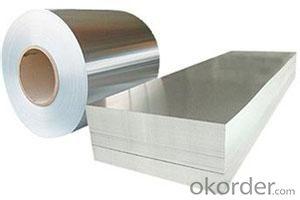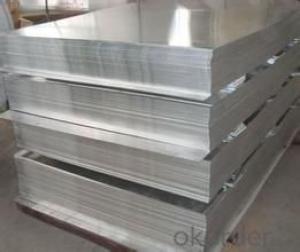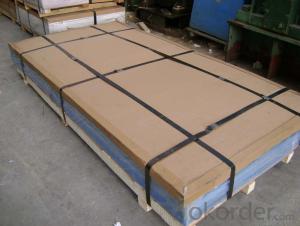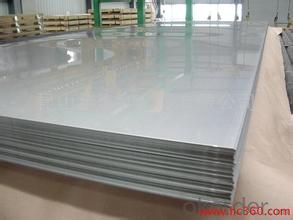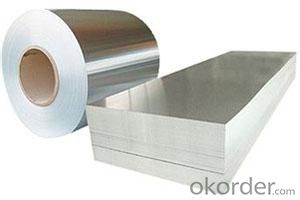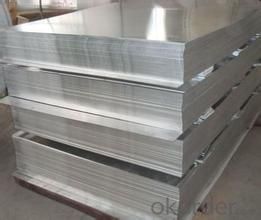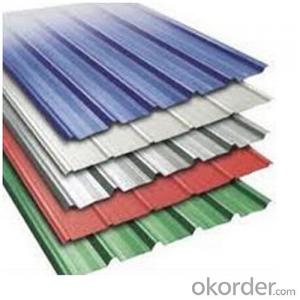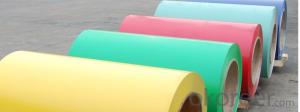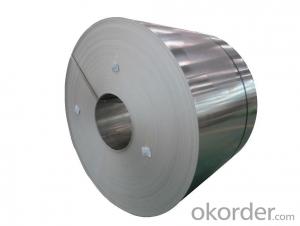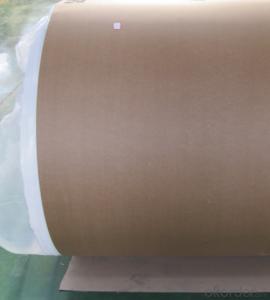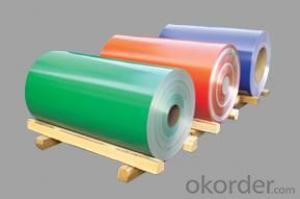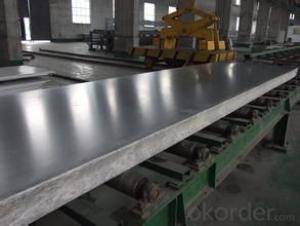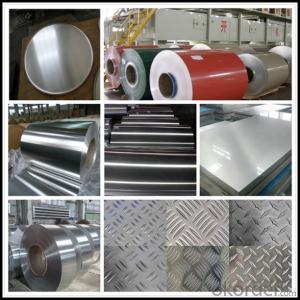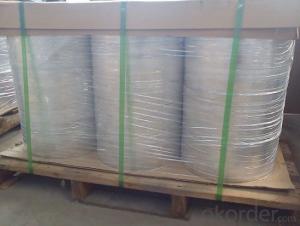Adhesive Aluminum Foil Sheets - Alu Sheet, Strip, Plate Hot Wholesale in China
- Loading Port:
- China Main Port
- Payment Terms:
- TT OR LC
- Min Order Qty:
- -
- Supply Capability:
- -
OKorder Service Pledge
OKorder Financial Service
You Might Also Like
Aluminium is a relatively soft,durable, lightweight, ductile and malleablemetal with appearance ranging from silvery to dull gray,depending on the surface roughness. It is nonmagnetic and does not easilyignite. A fresh film of aluminium serves as a good reflector (approximately92%) of visible light and an excellent reflector (as much as98%) of medium and far infrared radiation. The yield strength of pure aluminium is 7–11 MPa,while aluminium alloys have yield strengths ranging from200 MPa to 600 MPa. Aluminium has about one-third the density and stiffnessof steel. It iseasily machined,cast, drawn and extruded.
Alu Plate
Alloy: AA1050, 1060, 1100, AA3003, 3005, 3015, 5052, 5754, 5083,8011,etc
Temper:H14/16/18/22/24/32,HO etc.
Thickness:0.2mm—100mm
Width:100mm—2300mm (Can be slitted)
Application: Foil stock, Circles, Roofing, Canstock, Marine plate,Anti-sliperypurpose in vehicles, packing and appliance.
Features:
1. Excellent quality of products
2. Quick delivery
3. Best service to clients
4. BV,SGS avalible
5. No buckle o waveness
6. Tension leveling
7. Certificate of Origin
8. Form A,E
Packaging Detail: Carton ,Wooden pallet with plastic protection packing,standard seaworthy packing or as your request.
ProductionCapacity:
AnnualProduction capacity of 600,000 tons.
Products areexported to United States, Canada, U.A.E, Brazil, Mexico,Thailand, Vietnam,Nigeria etc, over 100 countries andregions all over the world.
Coveredfactories with full production line
CNBM aluminumproduction base is comprised of 18 aluminumannealers, 10 coil and foilmills, 4 continuous production lines, 2hot rolling production line and 3prepainted lines.
FAQ:
1. What is the form of payment?
Normally 30% TT, L/C
2. Type of quotation?
FOB, CFR, CIF
3. Port of loading?
Shanghai port
4. Delivery time?
30 day after client’s deposit
- Q: What are the various color and pattern options for aluminum sheets?
- <p>Aluminum sheets are available in a wide range of colors and patterns to suit various applications and aesthetic preferences. Colors can include silver, white, black, bronze, and many other shades. Patterns can range from simple matte or gloss finishes to more complex textures like wood grain, stone, and brushed metal effects. Some aluminum sheets also feature anodized finishes for enhanced durability and color vibrancy. Custom colors and patterns can be created through specialized coating processes, allowing for a high level of personalization in design and construction projects.</p>
- Q: Is it possible to use aluminum sheets as a material for exterior wall cladding?
- <p>Yes, aluminum sheets are commonly used for exterior wall cladding due to their durability, low maintenance, and resistance to weather conditions. They are lightweight, easy to install, and can be recycled, making them an environmentally friendly option. Aluminum sheets can also be painted or coated in various colors and finishes, offering design flexibility. However, it's important to ensure proper installation and sealing to prevent water infiltration and to maintain the integrity of the cladding system.</p>
- Q: Are there any health risks associated with using aluminum sheets?
- The use of aluminum sheets has sparked ongoing debate and research due to potential health risks. Although aluminum is widely utilized in various industries and products, it is crucial to consider certain factors. Health issues have been linked to exposure to high levels of aluminum through inhalation or ingestion. Studies suggest that aluminum exposure may be connected to neurological disorders like Alzheimer's disease or Parkinson's disease, as well as respiratory problems and bone disorders. Nevertheless, it is important to note that these studies have not definitively established a causal relationship between aluminum and these health conditions. The primary concern with aluminum lies in its ability to leach into food or beverages when it comes into contact with acidic or salty substances. This leaching can happen during food preparation or storage, especially when using aluminum cookware or foil. Consuming excessive amounts of aluminum through food or drink may pose health risks, especially for individuals with kidney disease or those who are more susceptible to aluminum toxicity. To minimize potential health risks, it is recommended to avoid using aluminum cookware or foil when cooking or storing acidic or salty foods. Instead, consider utilizing alternatives such as stainless steel, glass, or silicone. In conclusion, while there are worries about the potential health risks associated with using aluminum sheets, further research is necessary to establish a clear cause-and-effect relationship. It is wise to reduce exposure to aluminum, particularly through food and beverages, by taking preventive measures and employing alternative materials when suitable. Seeking guidance from healthcare professionals and staying informed about the latest research can assist individuals in making informed decisions regarding the use of aluminum sheets and other aluminum products.
- Q: Are aluminum sheets resistant to saltwater corrosion?
- Generally, aluminum sheets exhibit resistance to corrosion from saltwater. When exposed to air or water, including saltwater, aluminum naturally develops a protective oxide layer. This layer serves as a barrier, preventing additional corrosion and safeguarding the underlying metal. Furthermore, aluminum is both lightweight and durable, making it a favored choice for numerous marine applications such as boats, shipbuilding, and offshore structures. Nevertheless, it is important to acknowledge that the level of resistance to saltwater corrosion may differ based on the specific alloy and surface treatment of the aluminum sheets. Consequently, selecting the appropriate alloy and applying protective coatings can further enhance the corrosion resistance of aluminum sheets in saltwater environments.
- Q: Can the aluminum sheets be used for manufacturing chemical reactors?
- Yes, aluminum sheets can be used for manufacturing chemical reactors.
- Q: What is the standard thickness of aluminum sheets used for constructing carports or garages?
- <p>The thickness of aluminum sheets commonly used for carports or garages typically ranges from 0.022 to 0.032 inches (0.56 to 0.81 mm). This range provides a balance between strength and cost-effectiveness. Thicker sheets offer greater durability and resistance to weathering, while thinner sheets are more affordable but may require more maintenance over time. The specific thickness chosen often depends on the design requirements, local weather conditions, and the intended lifespan of the structure.</p>
- Q: Can the aluminum sheets be used for manufacturing chemical piping systems?
- Indeed, the utilization of aluminum sheets in the production of chemical piping systems is plausible. Renowned for its remarkable resistance against corrosion, aluminum proves to be apt for handling an array of chemicals. Moreover, its lightweight nature facilitates effortless installation and maintenance procedures. Furthermore, aluminum possesses commendable thermal conductivity, thereby enabling efficient heat transfer within chemical processes. Nonetheless, it is crucial to contemplate the distinctive demands imposed by the chemicals being conveyed and seek guidance from specialists to guarantee the selection of aluminum sheets equipped with indispensable properties and compatibility with the chemicals to be employed within the piping system.
- Q: What are the advantages of using 101 aluminum sheets over other materials?
- One advantage of using 101 aluminum sheets is their high strength-to-weight ratio, making them lightweight yet durable. Additionally, aluminum is highly resistant to corrosion, making it suitable for outdoor applications without the need for additional protective coatings. Aluminum sheets are also easy to work with due to their malleability, allowing for various forming and fabrication processes. Lastly, aluminum is a highly recyclable material, making it an environmentally friendly choice.
- Q: How are aluminum sheets manufactured?
- Aluminum sheets are manufactured through a process called rolling, where aluminum billets are heated and passed through a series of rolling mills to reduce their thickness. The billets are first heated to a specific temperature and then rolled multiple times, with each pass reducing the thickness of the sheet until the desired gauge is achieved. The process also involves annealing, where the sheets are heat-treated to improve their strength and flexibility. Finally, the sheets are cut to the desired length and width before being packaged for distribution.
Send your message to us
Adhesive Aluminum Foil Sheets - Alu Sheet, Strip, Plate Hot Wholesale in China
- Loading Port:
- China Main Port
- Payment Terms:
- TT OR LC
- Min Order Qty:
- -
- Supply Capability:
- -
OKorder Service Pledge
OKorder Financial Service
Similar products
Hot products
Hot Searches
Related keywords

